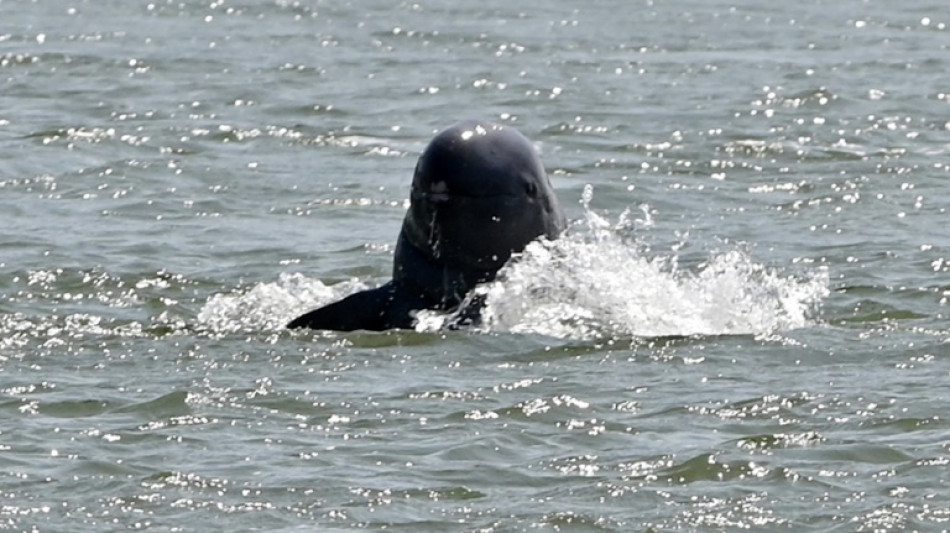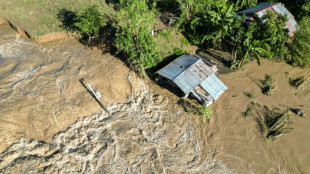
-
 French farmers step up protests against EU-Mercosur deal
French farmers step up protests against EU-Mercosur deal
-
Rose says Europe Ryder Cup stars play 'for the badge' not money

-
 Negotiators seek to break COP29 impasse after G20 'marching orders'
Negotiators seek to break COP29 impasse after G20 'marching orders'
-
Burst dike leaves Filipino farmers under water

-
 Markets rally after US bounce as Nvidia comes into focus
Markets rally after US bounce as Nvidia comes into focus
-
Crisis-hit Thyssenkrupp books another hefty annual loss

-
 US envoy in Lebanon for talks on halting Israel-Hezbollah war
US envoy in Lebanon for talks on halting Israel-Hezbollah war
-
India to send 5,000 extra troops to quell Manipur unrest

-
 Sex, drugs and gritty reality on Prague's underworld tours
Sex, drugs and gritty reality on Prague's underworld tours
-
Farmers descend on London to overturn inheritance tax change

-
 Clippers upset Warriors, Lillard saves Bucks
Clippers upset Warriors, Lillard saves Bucks
-
Acquitted 'Hong Kong 47' defendant sees freedom as responsibility

-
 Floods strike thousands of houses in northern Philippines
Floods strike thousands of houses in northern Philippines
-
Illegal farm fires fuel Indian capital's smog misery

-
 SpaceX set for Starship's next flight, Trump expected to attend
SpaceX set for Starship's next flight, Trump expected to attend
-
Texans cruise as Cowboys crisis deepens

-
 Do the Donald! Trump dance takes US sport by storm
Do the Donald! Trump dance takes US sport by storm
-
Home hero Cameron Smith desperate for first win of 2024 at Australian PGA

-
 Team Trump assails Biden decision on missiles for Ukraine
Team Trump assails Biden decision on missiles for Ukraine
-
Hong Kong court jails 45 democracy campaigners on subversion charges

-
 Several children injured in car crash at central China school
Several children injured in car crash at central China school
-
Urban mosquito sparks malaria surge in East Africa

-
 Djibouti experiments with GM mosquito against malaria
Djibouti experiments with GM mosquito against malaria
-
Pulisic at the double as USA cruise past Jamaica

-
 Many children injured after car crashes at central China school: state media
Many children injured after car crashes at central China school: state media
-
Asian markets rally after US bounce as Nvidia comes into focus

-
 Tens of thousands march in New Zealand Maori rights protest
Tens of thousands march in New Zealand Maori rights protest
-
Five takeaways from the G20 summit in Rio

-
 China, Russia ministers discuss Korea tensions at G20: state media
China, Russia ministers discuss Korea tensions at G20: state media
-
Kohli form, opening woes dog India ahead of Australia Test series

-
 Parts of Great Barrier Reef suffer highest coral mortality on record
Parts of Great Barrier Reef suffer highest coral mortality on record
-
Defiant Lebanese harvest olives in the shadow of war

-
 Russian delegations visit Pyongyang as Ukraine war deepens ties
Russian delegations visit Pyongyang as Ukraine war deepens ties
-
S.Africa offers a lesson on how not to shut down a coal plant

-
 Italy beat Swiatek's Poland to reach BJK Cup final
Italy beat Swiatek's Poland to reach BJK Cup final
-
Japan, UK to hold regular economic security talks

-
 Divided G20 fails to agree on climate, Ukraine
Divided G20 fails to agree on climate, Ukraine
-
Can the Trump-Musk 'bromance' last?

-
 US to call for Google to sell Chrome browser: report
US to call for Google to sell Chrome browser: report
-
Macron hails 'good' US decision on Ukraine missiles

-
 Italy eliminate Swiatek's Poland to reach BJK Cup final
Italy eliminate Swiatek's Poland to reach BJK Cup final
-
Trump expected to attend next Starship rocket launch: reports

-
 Israeli strike on Beirut kills 5 as deadly rocket fire hits Israel
Israeli strike on Beirut kills 5 as deadly rocket fire hits Israel
-
Gvardiol steals in to ensure Croatia reach Nations League quarter-finals

-
 Thousands march to New Zealand's parliament in Maori rights protest
Thousands march to New Zealand's parliament in Maori rights protest
-
China's Xi urges G20 to help 'cool' Ukraine crisis

-
 Church and state clash over entry fee for Paris's Notre Dame
Church and state clash over entry fee for Paris's Notre Dame
-
Holders Spain strike late to beat Switzerland in Nations League

-
 Stocks, dollar hesitant as traders brace for Nvidia earnings
Stocks, dollar hesitant as traders brace for Nvidia earnings
-
Swiatek saves Poland against Italy in BJK Cup semi, forces doubles decider


Hope for Mekong dolphins as Cambodia numbers increase: minister
The number of Mekong dolphins has risen to more than 100 in Cambodia, the agriculture minister said Monday, raising a glimmer of hope for the endangered mammals.
Irrawaddy dolphins -- small, shy creatures with domed foreheads and short beaks -- once swam through much of the mighty Mekong, all the way to the delta in Vietnam.
But their population in the river has dwindled from 200, when the first census was taken in 1997, to just 89 in 2020, largely due to illegal fishing, habitat loss and plastic waste.
"Currently, we have some 105 dolphins," Agriculture Minister Dith Tina said during a ceremony to mark National Fisheries Day.
In the first six months of this year, eight new dolphin calves were recorded, but there were also two deaths, the agricultural ministry said.
The boost to numbers follows the birth of eight dolphins last year, a ministry statement said, while 2023 also saw five deaths recorded.
"The ministry has strongly taken measures against fishing offences and the making and distributing of destructive fishing tools that seriously damage marine resources," Dith Tina said.
Last year Cambodia's then leader Hun Sen U-turned on a law to protect the species, saying "dolphins keep dying" while the fishing industry suffered from the conservation legislation.
Irrawaddy dolphins feature on the "Red List" of endangered wildlife by the International Union for Conservation of Nature (IUCN).
Adding to concerns about their survival, around 70 percent of the population is now too old to breed.
The dolphins' habitat has also been reduced by upstream dams in Laos and China and climate change, which have had a major impact on water levels in the river.
J.Gomez--AT

